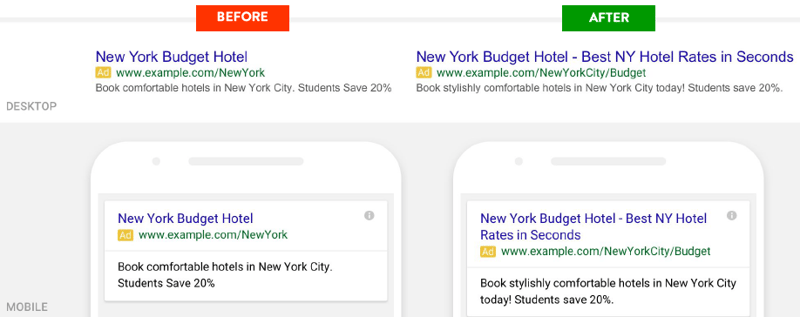On January 31st, Google fully launched their new Extended Text Ads. All new ads will be ETAs, and most ads in older formats will disappear within days.
The next major change, announced in November and expected to be rolled out over the next few months, is the creation of a mobile-first index.
We explain what both changes mean for hotels below:
Extended Text Ads
Extended text ads (ETAs) are the biggest change since AdWords was born 15 years ago. And it’s all driven by mobile. They’re designed for bigger headlines and longer descriptions on mobile search results.
ETAs are part of the recent big changes that Google has rolled out to AdWords. They’re live in some instances already, and Google has announced that every text ad will be an ETA by the January 31st. What’s changing?
- Headlines are expanding from a single 25-character headline to two 30-character headlines.
- Descriptions are growing from two 35-character lines to one 80-character description line.
- Display URLs will have the domain automatically extracted from the final URL. Advertisers will be able to add up to two paths to enhance the URL.
ETAs are double the size of the ads we’re familiar with. On desktop, this mostly equates to wider, not taller ads.

On mobile, however, these new ad formats push organic results far down the page. We are seeing 3 screen scrolls on average before you reach an organic listing when the ads have been updated.
These ads take up a lot more real estate and push organic search results even further down the page.
What does this mean for your hotel?
Are ETAs affecting click-through rates? Yes. Early tests show CTRs increasing anywhere between 26% and 167%, compared to the standard text ad format. These numbers will change for individual hotels and even individual ads, though, so test to see what works for you!
These changes will continue to drive more paid traffic through advert engagements and less organic traffic from mobile devices, especially once they’re fully live. Since mobile traffic is growing overall, this means that paid traffic will grow overall as well.
For best practices, here are few short points from Hubspot to keep in mind:
- Use keywords and persuasive copy in your headlines: it’s the section people will see first, and it needs to have your most important information! With extended text ads, you have the freedom to be a bit creative, and you can blend in two or three of your most important keyword phrases.
- The description is for differentiation: you grab attention with your headline, and the description convinces them to click through to your landing page. Hubspot recommends 1 additional benefit + 1 feature + 1 call-to-action – like Book Now!
- Ensure your ad works well on mobile. With ETAs, AdWords no longer lets you create separate mobile ads – it’s the same ad and copy for every device. Use the mobile preview to make sure titles and copy aren’t broken up oddly.
Mobile-First Index
What exactly is a mobile-first index? It means that Google will “create and rank its search listings based on the mobile version of content” – even for listings shown on desktop.
Essentially, Google is looking at the web from a mobile user’s perspective, not a desktop user’s. If you don’t have a mobile site, though, Google says it’s still okay – for now. According to Google, “If you only have a desktop site, we’ll continue to index your desktop site just fine, even if we’re using a mobile user agent to view your site.”
However, you probably won’t rank quite as highly without a mobile site. Google penalizes sites that aren’t mobile-friendly, and will continue to do so.
What does this mean for your hotel website?
First off, don’t get too nervous. Google hopes that this change won’t actually have too much impact on search results. However, there are a few things that could significantly impact your ranking.
In a nutshell, it means that instead of pulling ranking signals (things like site speed, content, meta tags, and more) from your desktop site, Google will pull them from your mobile site.
You must prepare your mobile site for this. If your mobile website is slower than your desktop site, for example, that will be a mark against your new ranking.
Similarly, make sure your content is structured properly on your mobile site – chat to your local SEO expert if you’re stuck! Look at titles, meta tags, meta descriptions, etc.
Lastly, what about links? Google search results place a lot of importance on links, and most mobile sites have fewer links than desktop, to improve user experience. On this, Search Engine Land tells us that Google’s Gary Illyes says they’re still testing. “I don’t want to say anything definite about links yet. It’s too early for that cos things are very much in motion.”
Conlcusion
Both extended text ads and the mobile-first index are big changes for Google, and it’s not yet fully clear exactly how they will impact hotels. However, there are a few important steps you can take to make sure you’re prepared.
Pay attention to best practices for ETAs, both the guidelines we have now and the ones that will emerge in the next few months as we get more data. For the mobile-first index, do a check on your mobile site to make sure it’s up to scratch.
How do you think these changes are likely to impact hotels? What will they mean for paid search budgets and mobile web design?
Words by Tayor Smariga



